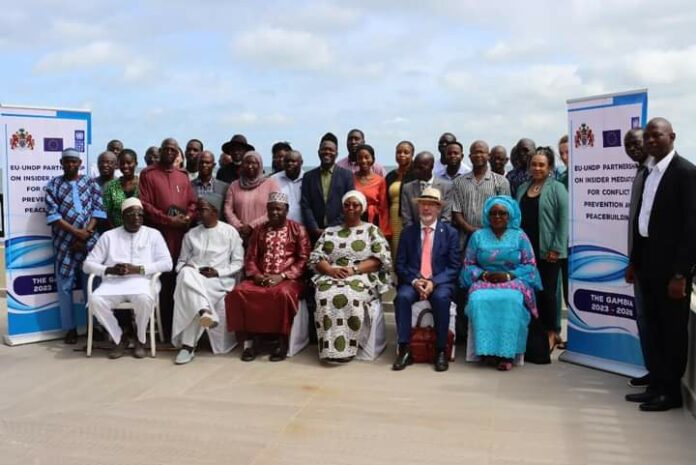By: Alieu Jallow
On September 6th, the Gambia government, along with its developmental partners including the EU, UNDP, and WANEP, launched the Insider Mediation project aimed at strengthening the decentralised insider mediation in The Gambia through various events like a national consultative conference on insider mediators and a roundtable discussion.
The Minister of Interior, Hon. Siaka Sonko, spoke on behalf of the Gambia government and mentioned that the concept of insider mediation is not new in The Gambia from a cultural perspective. It has been a common practice amongst the majority of Gambians.
“In the Gambia, joking relationships are a prominent part of conflict management and peace-making, and therefore generally view mediation more as a matter of persuading disputants to end their conflict and reconcile than as a structured process of facilitated problem solving and negotiation,” he said.
Hon. Sonko explained that joking relationships are a highly effective social institution used by Gambian mediators to resolve conflicts. These relationships are particularly fascinating because they have been instrumental in transforming long-standing conflicts that were previously resistant to intervention efforts. In addition to the cultural perspective, Gambians continue to practice insider mediation conventionally, as seen during the Gambia’s transition and the 3 Years Jotna movement.
On his part, the EU Ambassador to the Gambia, Carrado Pampaloni, emphasized the importance of national ownership of peace mediation networks for conflict prevention. He sees it as an encouraging sign that a range of government and civil society representatives are assembled to support Gambian efforts in mediating peace across local, regional, and national levels.
According to Ambassador Pampaloni, the EU, in partnership with UNDP, is looking forward to supporting Gambian efforts in mediating peace across the local, regional, and national levels as the country continues its quest for transitional justice in the post-TRRC context.
“Insider Mediation will contribute to a lasting infrastructure for Peace that the Gambia is currently constructing”.
The UNDP country representative, Assiata De, emphasised that strengthening insider mediation in the Gambia is a timely endeavour and since 2017, the government and civil society have furthered efforts to establish a national infrastructure for Peace in the Gambia with support from international partners.
“UNDP is currently co-convening a project funded by the Peacebuilding Fund that institutionalizes these efforts, implementing a key recommendation of the post-TRRC.
“The three-year Insider Mediation project seamlessly enhances the identification and coordination of local peacebuilders who may act as Insider Mediators in conflicts at the local, regional or national level. Insider Mediators will therefore be trained as a long-term resource for the Gambia’s Infrastructure,” Assiata said.
Salma Njie of WANEP highlighted that the Gambia continues to deal with an array of internal challenges threatening peace and security, including land disputes and environment, political tension as well as inter-ethnic tolerance and polarization associated with perceptions of discrimination despite some of the advances in the course of ongoing reforms such as legal, electoral, security sector, civil society to mention a few.
“Key structural challenges also present obstacles to the country’s transitional process, in particular, is the absence of spaces for social cohesion and reconciliation”.
At the end of the two-day consultative conference, stakeholders are expected to come up with a draft guidance on how to identify insiders at a national, regional and local level with a focus on reflecting on best practices of insider mediation from across West Africa especially Ghana and Sierra Leone, in relation to the Gambia.




